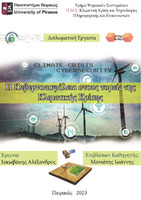Η κυβερνοασφάλεια στους τομείς της κλιματικής κρίσης
Cybersecurity in climate crisis

Προβολή/
Λέξεις κλειδιά
Cybersecurity ; Climate crisis ; Κυβερνοασφάλεια ; Κλιματική κρίση ; Blockchain ; Logistics ; Γεωργία ακριβείας ; Smart grids ; Smart grids cybersecurity ; Precision agriculture cybersecurity ; Blockchain logistics ; Έξυπνα δίκτυα ηλεκτρικής ενέργειαςΠερίληψη
Το φαινόμενο του θερμοκηπίου είναι το κύριο αίτιο της κλιματικής κρίσης. Ορισμένα αέρια, με κυριότερα το μεθάνιο, το διοξείδιο του άνθρακα, τα φθοριούχα αέρια και το οξείδιο του αζώτου στην ατμόσφαιρα της Γης μιμούνται την επίδραση του γυαλιού του θερμοκηπίου παγιδεύοντας την ηλιακή θερμότητα και εμποδίζοντάς την να διαφύγει πίσω στο διάστημα, γεγονός το οποίο συμβάλλει στην υπερθέρμανση του πλανήτη και στην αύξηση των ξαφνικών καιρικών αλλαγών και σε διαρκώς αυξανόμενης έντασης επικίνδυνων καιρικών φαινομένων. Χαρακτηριστικά, η ατμοσφαιρική συγκέντρωσή του διοξειδίου του άνθρακα αυξήθηκε στο 48% σε σχέση με τα προβιομηχανικά επίπεδα (πριν από το 1750) μέχρι το 2020.
Στην Ευρωπαϊκή Ένωση, το δεύτερο τρίμηνο του 2022, οι τομείς της οικονομίας οι οποίοι εξέπεμψαν τις περισσότερες εκπομπές αερίων του θερμοκηπίου ήταν οι Κατασκευές και η Μεταποίηση (23%), η Ηλεκτρική Ενέργεια, η παροχή Aερίου (19%) και τα Νοικοκυριά (17%), ακολουθούμενες από τις Μεταφορές και την Αποθήκευση Προϊόντων (14%) και τη Γεωργία (13%).
Ο ρόλος της Πληροφορικής και των Τεχνολογιών των Επικοινωνιών αναδεικνύεται κομβικός εφόσον οδηγεί τόσο στην ψηφιοποίηση των διαδικασιών, όσο και στην ολοένα αποδοτικότερη χρήση των πόρων στους προαναφερθέντες τομείς. Ωστόσο, προϋπόθεση για την ομαλή λειτουργία των πληροφοριακών συστημάτων και των τηλεπικοινωνιών είναι η τήρηση και η λήψη μέτρων ασφαλείας, δηλαδή η Κυβερνοασφάλεια. Πιο συγκεκριμένα, το ζητούμενο στην Κυβερνοασφάλεια, είναι η ασφάλεια των συσκευών και των δεδομένων από επιθέσεις πολλών πλευρών που έχουν στόχο την καταστροφή ή την αλίευση δεδομένων.
Σκοπός της διπλωματικής εργασίας είναι η μελέτη της Κυβερνοασφάλειας και η ανάδειξη της σημασίας της στους βασικούς τομείς που συντελούν στην Κλιματική Κρίση, στην Ευφυή Γεωργία, στις Μεταφορές και την Αποθήκευση Προϊόντων (Logistics) και τέλος στην Ενέργεια και στις Έξυπνες Πόλεις του μέλλοντος. Η έρευνα πραγματοποιήθηκε τόσο χρησιμοποιώντας βιβλιογραφία από επιστημονικά άρθρα εφαρμόζοντας τις κατάλληλες βιβλιομετρικές μεθόδους, όσο και αξιοποιώντας στοιχεία διαπιστευμένων πηγών, δηλαδή έρευνες και ειδησεογραφία από το διαδίκτυο.
Στο πρώτο κεφάλαιο παρουσιάζεται και αναπτύσσεται η σημασία της Κυβερνοασφάλειας στη Γεωργία Ακριβείας. Στο δεύτερο κεφάλαιο αναλύεται η τεχνολογία Blockchain, ήτοι του πρωτοκόλλου του μέλλοντος στην Κυβερνοασφάλεια, στον χώρο των Μεταφορών και Αποθήκευσης Προϊόντων. Τέλος, στο τρίτο κεφάλαιο όσον αφορά τους χώρους της Ενέργειας και των Έξυπνων Πόλεων, πραγματοποιείται έρευνα στα επερχόμενα Έξυπνα Δίκτυα Ηλεκτρικής Ενέργειας και τους κανόνες Κυβερνοασφάλειας που θα τα διέπουν.


